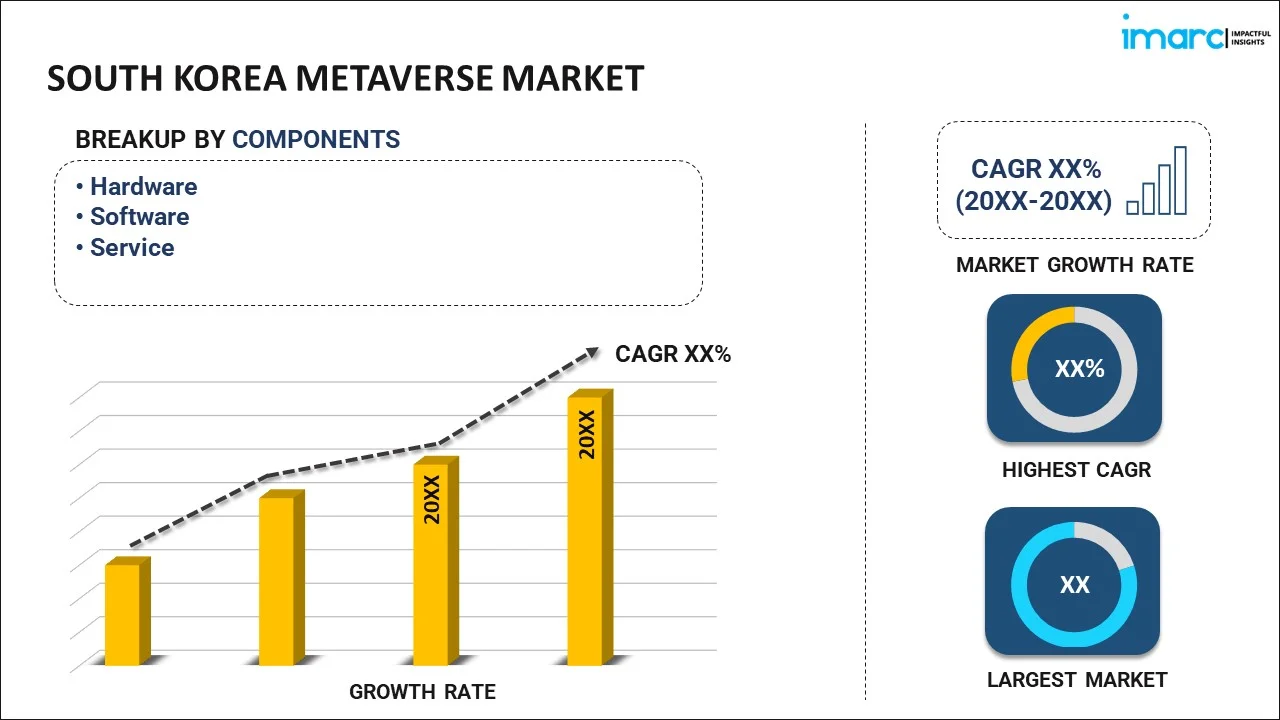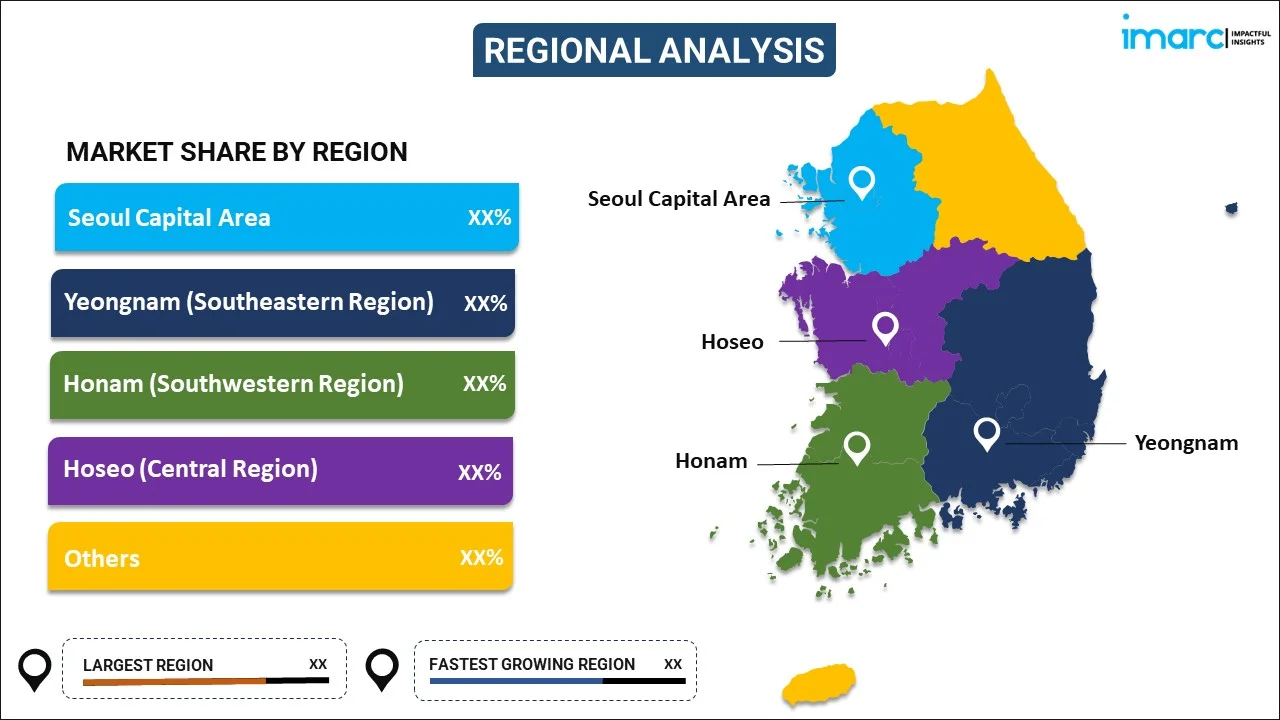
South Korea Metaverse Market Report by Component (Hardware, Software, Service), Technology (Blockchain, Virtual Reality and Augmented Reality, Mixed Reality, and Others), Application (Gaming, Online Shopping, Content Creation and Social Media, Events and Conference, Digital Marketing, Testing and Inspection, and Others), Industry Vertical (BFSI, Retail, Media and Entertainment, Education, Aerospace and Defense, Automotive, and Others), and Region 2025-2033
Market Overview:
South Korea metaverse market size reached USD 2,527.1 Million in 2024. Looking forward, IMARC Group expects the market to reach USD 32,960.8 Million by 2033, exhibiting a growth rate (CAGR) of 33% during 2025-2033. The widespread adoption of virtual platforms for work, social interaction, and entertainment is primarily driving the market growth.
|
Report Attribute
|
Key Statistics
|
|---|---|
|
Base Year
|
2024
|
|
Forecast Years
|
2025-2033
|
|
Historical Years
|
2019-2024
|
| Market Size in 2024 | USD 2,527.1 Million |
| Market Forecast in 2033 | USD 32,960.8 Million |
| Market Growth Rate 2025-2033 | 33% |
The metaverse is a digital realm where individuals, represented as avatars, can engage with each other and computer programs in real time. Constructed through augmented reality (AR), virtual reality (VR), and blockchain technologies, its goal is to deliver a fully immersive experience beyond the confines of the physical world. This expansive ecosystem comprises interconnected digital spaces. From a business standpoint, the metaverse presents numerous opportunities for commerce, social interaction, and data exchange, positioning itself as a frontier for investment and advancement. The concept has captivated the imagination of technologists, business leaders, and consumers alike, emerging as a topic of growing significance in conversations surrounding the future of the internet and the digital economy.
South Korea Metaverse Market Trends:
The metaverse is experiencing burgeoning interest and momentum in South Korea, driven by a confluence of technological innovation, cultural affinity for digital experiences, and a forward-thinking business landscape. Additionally, as a nation at the forefront of technological advancements, South Korea embraces metaverse technologies such as augmented reality (AR), virtual reality (VR), and blockchain to create immersive digital environments. The country's robust IT infrastructure and widespread connectivity further propel the development and adoption of metaverse applications. Moreover, from a business perspective, the metaverse in South Korea presents compelling opportunities across various sectors, which is acting as another significant growth-inducing factor. Apart from this, industries are exploring metaverse platforms for innovative marketing strategies, virtual commerce, and enhanced customer engagement. Real estate ventures are integrating metaverse technologies for virtual property tours and simulations. The gaming industry, deeply ingrained in South Korean culture, is a natural fit for metaverse expansion, offering interactive and immersive experiences beyond traditional gaming. Socially, South Koreans, known for their enthusiasm for digital culture, are embracing metaverse platforms for social interactions, events, and entertainment. Government initiatives and investments further amplify the metaverse's prominence, positioning South Korea as a key player in the metaverse landscape. Furthermore, technological prowess, cultural resonance, and forward-looking business strategies, shaping the nation's digital future, which is anticipated to fuel the regional market over the forecasted period.
South Korea Metaverse Market Segmentation:
IMARC Group provides an analysis of the key trends in each segment of the market, along with forecasts at the country level for 2025-2033. Our report has categorized the market based on component, technology, application, and industry vertical.
Component Insights:

- Hardware
- Software
- Service
The report has provided a detailed breakup and analysis of the market based on the component. This includes hardware, software, and service.
Technology Insights:
- Blockchain
- Virtual Reality and Augmented Reality
- Mixed Reality
- Others
A detailed breakup and analysis of the market based on the technology have also been provided in the report. This includes blockchain, virtual reality and augmented reality, mixed reality, and others.
Application Insights:
- Gaming
- Online Shopping
- Content Creation and Social Media
- Events and Conference
- Digital Marketing
- Testing and Inspection
- Others
The report has provided a detailed breakup and analysis of the market based on the application. This includes gaming, online shopping, content creation and social media, events and conference, digital marketing, testing and inspection, and others.
Industry Vertical Insights:
- BFSI
- Retail
- Media and Entertainment
- Education
- Aerospace and Defense
- Automotive
- Others
A detailed breakup and analysis of the market based on the industry vertical have also been provided in the report. This includes BFSI, retail, media and entertainment, education, aerospace and defense, automotive, and others.
Regional Insights:

- Seoul Capital Area
- Yeongam (Southeastern Region)
- Honam (Southwestern Region)
- Hoseo (Central Region)
- Others
The report has also provided a comprehensive analysis of all the major regional markets, which include Seoul Capital Area, Yeongam (Southeastern Region), Honam (Southwestern Region), Hoseo (Central Region), and Others.
Competitive Landscape:
The market research report has also provided a comprehensive analysis of the competitive landscape in the market. Competitive analysis such as market structure, key player positioning, top winning strategies, competitive dashboard, and company evaluation quadrant has been covered in the report. Also, detailed profiles of all major companies have been provided.
South Korea Metaverse Market Report Coverage:
| Report Features | Details |
|---|---|
| Base Year of the Analysis | 2024 |
| Historical Period | 2019-2024 |
| Forecast Period | 2025-2033 |
| Units | Million USD |
| Scope of the Report | Exploration of Historical and Forecast Trends, Industry Catalysts and Challenges, Segment-Wise Historical and Predictive Market Assessment:
|
| Components Covered | Hardware, Software, Service |
| Technologies Covered | Blockchain, Virtual Reality and Augmented Reality, Mixed Reality, Others |
| Applications Covered | Gaming, Online Shopping, Content Creation and Social Media, Events and Conference, Digital Marketing, Testing and Inspection, Others |
| Industry Verticals Covered | BFSI, Retail, Media and Entertainment, Education, Aerospace and Defense, Automotive, Others |
| Regions Covered | Seoul Capital Area, Youngman (Southeastern Region), Honam (Southwestern Region), Hoseo (Central Region), Others |
| Customization Scope | 10% Free Customization |
| Post-Sale Analyst Support | 10-12 Weeks |
| Delivery Format | PDF and Excel through Email (We can also provide the editable version of the report in PPT/Word format on special request) |
Key Questions Answered in This Report:
- How has the South Korea metaverse market performed so far and how will it perform in the coming years?
- What has been the impact of COVID-19 on the South Korea metaverse market?
- What is the breakup of the South Korea metaverse market on the basis of component?
- What is the breakup of the South Korea metaverse market on the basis of technology?
- What is the breakup of the South Korea metaverse market on the basis of application?
- What is the breakup of the South Korea metaverse market on the basis of industry vertical?
- What are the various stages in the value chain of the South Korea metaverse market?
- What are the key driving factors and challenges in the South Korea metaverse?
- What is the structure of the South Korea metaverse market and who are the key players?
- What is the degree of competition in the South Korea metaverse market?
Key Benefits for Stakeholders:
- IMARC’s industry report offers a comprehensive quantitative analysis of various market segments, historical and current market trends, market forecasts, and dynamics of the South Korea metaverse market from 2019-2033.
- The research report provides the latest information on the market drivers, challenges, and opportunities in the South Korea metaverse market.
- Porter's five forces analysis assist stakeholders in assessing the impact of new entrants, competitive rivalry, supplier power, buyer power, and the threat of substitution. It helps stakeholders to analyze the level of competition within the South Korea metaverse industry and its attractiveness.
- Competitive landscape allows stakeholders to understand their competitive environment and provides an insight into the current positions of key players in the market.
Need more help?
- Speak to our experienced analysts for insights on the current market scenarios.
- Include additional segments and countries to customize the report as per your requirement.
- Gain an unparalleled competitive advantage in your domain by understanding how to utilize the report and positively impacting your operations and revenue.
- For further assistance, please connect with our analysts.
 Request Customization
Request Customization
 Speak to an Analyst
Speak to an Analyst
 Request Brochure
Request Brochure
 Inquire Before Buying
Inquire Before Buying




.webp)




.webp)












